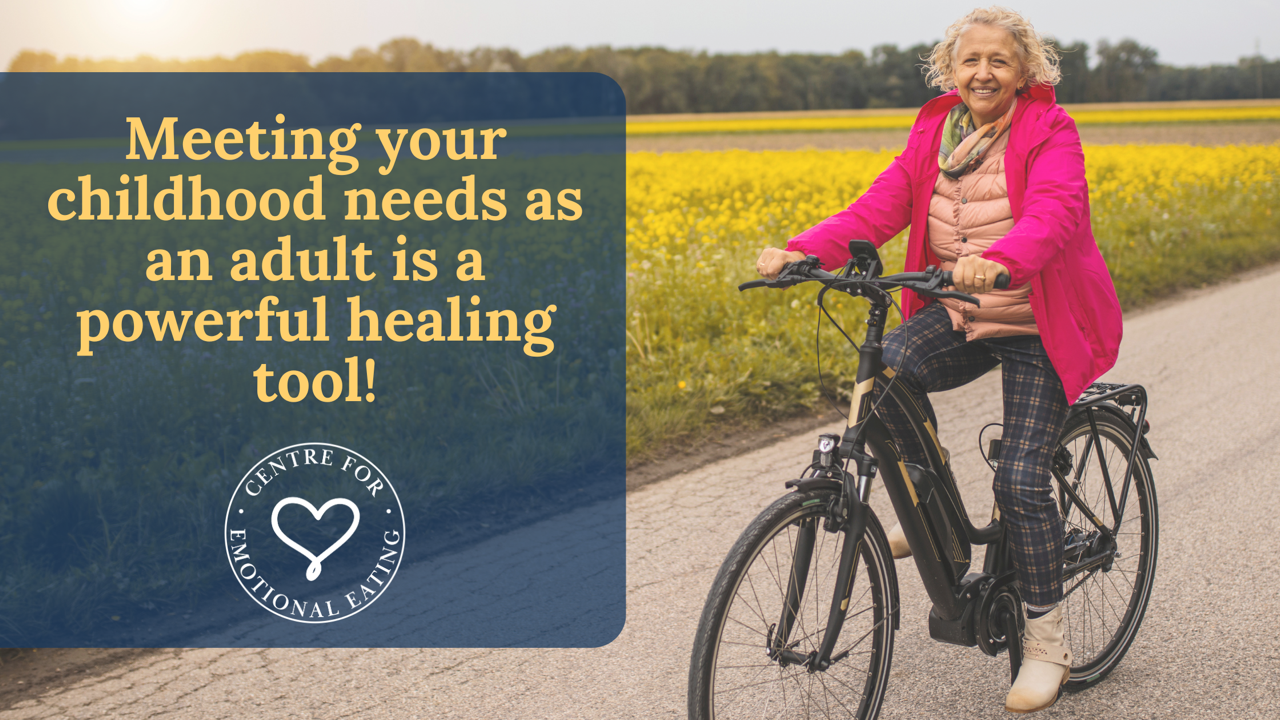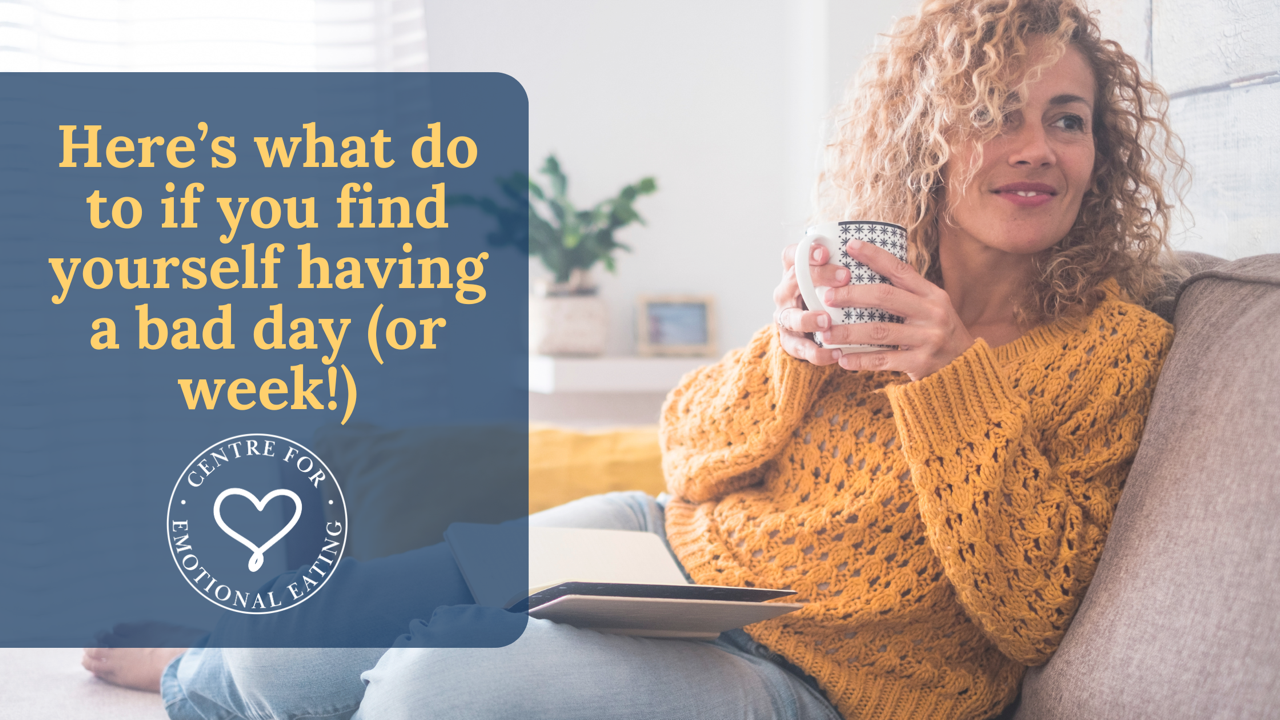BLOG
Find support not just for emotional eating, but all aspects of your well-being.
Reparenting: Learning to Support the Younger You

Often here at the Centre for Emotional Eating we talk about how your patterns and habits with food are influenced not by the cravings themselves, but the root cause behind what makes you act.
For many, the root cause can be found in childhood or adolescent experiences. This is because as our brains and bodies grow, we are learning and are influenced by examples displayed around us—to finish what’s on our plate, diet talk, stuffing down emotions, just to name a few. We learn from parents, caregivers, teachers, coaches, siblings, and friendship circles! But not all of these lessons will serve you as you grow into your own adulthood, some might be downright painful or destructive.
It is incredibly common to reach a point in your adult life and know things need to change but not know how. This is where therapy can be a very helpful tool in helping you sort through your thoughts and feelings, gain confidence to make your own decisions, and help you feel more resilient.
And one effective ...
Emotional Eating Toolkit: Creating a Comfort Box

We all have bad days (heck, even weeks!) where we feel drained, angry, or even upset most of the time. If this comes up for you, it is time to create a comfort box. This can be a great resource to build yourself back up when you’re feeling low.
Here’s how to do it:
The next time you’re feeling in a good place, put together a physical box or digital list that has things that bring you comfort when your mood is low. You can include:
- A playlist or movie that lifts you up (or helps you cry). This could be either to pump up your energy or create an emotional release. It can sometimes be difficult to allow ourselves to cry when we’ve been holding it together for so long; we often judge ourselves less when we’re crying over a fictional character.
- A candle you’ve always wanted to burn or a face mask you’re wanted to try. Often, we keep certain things for a “special occasion”, but why wait! Being able to indulge in little luxuries might just give you the small boost you’re looking for (in ...
Three Ways to Manage Your Emotions

Emotional eating bubbles up when you don’t want to feel or experience something. Food is always available and seems like an easier route than facing things head on. But the truth is, your feelings just want to be heard and comforted by you. That is the key to breaking out of the emotional eating cycle, not more will power.
This sense of confrontation can feel very scary when you’ve spent years avoiding your feelings, so we’re sharing 3 great ways to get your emotions out in a way that will help you recognize them and move through them—instead of being stuck in the trigger-eat-regret cycle:
Use your voice. One of the best ways to help diffuse the intensity of your emotions is to talk to yourself out loud. This might feel silly at first, but it can be a great way to identify what exactly you are feeling. Find a space alone (the bathroom is a great one!) and start to find your words, for example: “I am feeling really attacked right now”, “I’m so worried I disappointed them and they are ...
There Are No Negative Emotions

As an emotional eater you might feel like you can identify emotions as either good or bad.
Hope, joy, satisfaction, those must be good because they make you feel positive and present.
Anxiety, sadness, anger, those must be bad because they feel uncomfortable and challenging.
This is called black-and-white thinking or sometimes referred to as all-or-nothing thinking. Chances are you learned this way of thinking from family and society. Were you ever told to hide what you were feeling to make others more comfortable? Or maybe you were told that emotions are weak or to “put your big girl pants on.” Just like labeling foods as either good or bad, approaching emotions the same way doesn’t allow for the truth: that there is a much more neutral, or grey, area.
Let’s reframe! What if instead of thinking of certain emotions as bad, you replace that thought with a neutral one like “there are no bad emotions.” This neutrality means we’re not pretending to be happy or applying a toxic positivi...
Finding Some Comfort While Grieving

We’re told that grief has stages that we move through, that there is an end to the process. But the truth is much more complex than that. While its intensity can lessen over time, there are often triggers, sometimes unexpected ones, that bring up feelings in new and painful ways.
And while grief is a common experience, it is still a topic many feel uncomfortable talking about. For example, if you’ve lost someone you love, others in your community might not know how to talk to you about it even if you want to keep the conversation—and memory—of your person present. Others often worry they are making you feel worse you by asking how you’re coping.
If you are struggling with grief right now, we want you to know there is no right or wrong way to move through it. To start, reach out to someone you trust or get support from a therapist to help guide you. You might be surprised how freeing it feels to have a safe space to cry or rage. This can create a release of emotions that you don’t hav...
How to Trust Feeling Good After Life Throws You a Curveball

Being on the other side of a challenging life changing event can feel destabilizing. After a period of new levels of anxiety or depression symptoms, you don’t trust feeling good. The truth is that you’re no longer used to feeling positive.
You might feel foolish for not immediately embracing the good, but this lack of trust is much more common than you think! Below we’ve outlined the three stages you can expect when you’ve done the work to move through big emotions and negative experiences.
Step One: You Can’t Believe It
At some point in your recovery, you will notice a subtle shift. It might be in a therapy session when you realize you’re talking about your experiences differently or it might be a moment during your day where you think or react differently than you would in the past. This might be accompanied by a rush of gratitude: you’ve made a change and are “on the other side.”
This will likely be immediately followed by mentally shutting down recognizing (or celebrating!) thi...
How to Plan for a Death Anniversary

The anniversary of the death of a loved one comes with its own unique challenges. Unlike birthdays or weddings, the day your loved one passed is a focal point for your grief and can bring all the feelings of loss right back to the surface.
While you might expect the day to be difficult, you might find engaging in some sort of memorial—big or small—can be a lovely way to honour their memory and support your own mental health.
There are so many ways you can honour your loved one! To get you thinking about what might be helpful for you, here’s a list of 10 things you can do to remember your person. You can either choose to do something by yourself or with others—the choice is completely up to you and there is no right or wrong way to mourn.
- Hold space to let out the emotions—cry, rage, whatever! Sometimes a sad playlist or movie will allow the tears to flow, other times you might want to sweat it out at the gym.
- Visit their final resting place. Bring flowers, read a poem, or simpl ...


